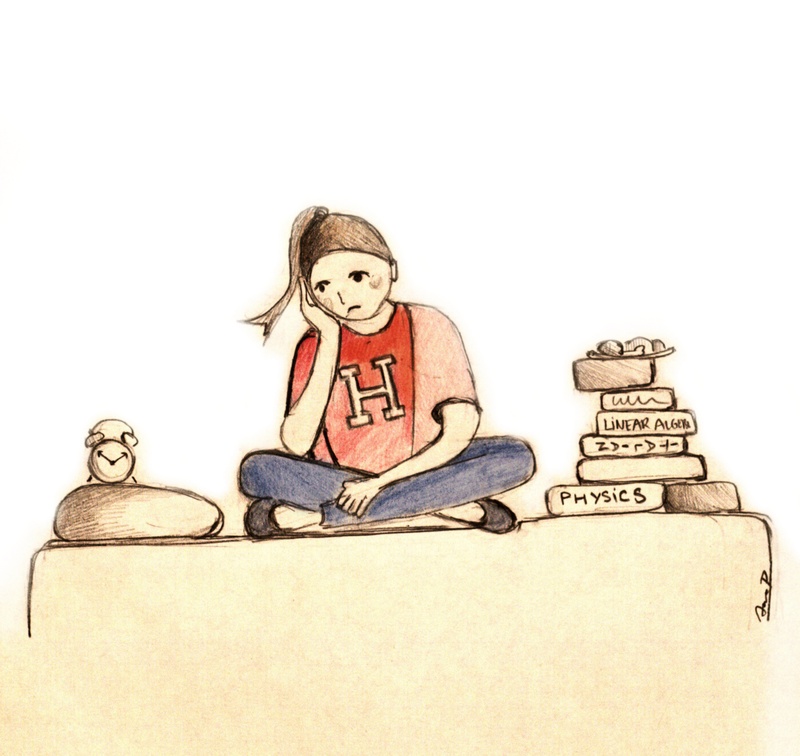When I read the words, “Dear Mr. Piltch, Congratulations! On behalf of the Admissions Committee, I am delighted to offer you admission to the Harvard Class of 2017,” I remember an excited shout escaping my throat because I was going to Harvard. At that time, however, I had little appreciation for what going to Harvard meant. I saw it as a real life version of a Harry Potter book: all different people from all different places (practically) doing magic to solve the world’s problems. I would never be alone and would meet no challenge I could not handle. Somehow, in this wonderland, the tough moments of feeling alone, being overwhelmed by or not understanding my work, and being disconnected from friends did not exist.
A recent Crimson article, “The State of the Student Body,” makes it clear that these struggles exist not only for me but also many of my peers. Seventy percent of us do not sleep enough. Many of us do not exercise enough, and I imagine that some of us struggle with disordered eating. I am also confident that stress has unquantifiable effects on our friendships and other relationships. Though we may not realize it, the difficult moments and enormous sums of work we have dictate our lives more than we might have anticipated or currently want.
The question is, “How do we fix this?” While I concur with Dean Dingman that we must change Harvard’s culture surrounding stress and wellbeing, I believe that the students cannot do this alone. Instead, the students, faculty, and administration need to work together towards a better, healthier community.
The changes the faculty must make ask them to think about students outside the classroom and understand that social, familial, and mental health challenges are at times much more important than the academic work we do. If faculty affirm this reality verbally and show genuine compassion, students will feel more comfortable sharing the challenges associated with doing their best work. Furthermore, faculty, with the help of the administration, should remove pressure from students by instituting a system in all classes that makes extension days readily available for students. Even the knowledge that an extra day or two is there if needed can help a student’s state-of-mind greatly. Similarly, it would help students enormously if professors from all disciplines work together to create a balance in students’ lives by each having a different week or two in the thick of the semester when reading demands are lighter and problem sets are shorter. This break would aid students greatly in handling all of their other work and addressing personal needs. If such a plan could be developed, students would be healthier and would demonstrate a deeper commitment to the work that professors deem most important to their classes.
More complex to execute but equally as important, we must be conscious of the ways we talk about the difficulties and stresses that do exist. I have gradually realized that Harvard is not the wonderland I imagined. There have been many nights when I stared at one page of my reading for fifteen minutes without comprehending it. I also feel alone at times, both physically and psychologically, and no number of parties or hangouts can fix it. Furthermore, regardless of the extracurricular activities I join or satisfying grades I receive, I sometimes feel like I do not belong; like I am the mistake; like I do not deserve to be here.
I imagine other students feel the same way, but acknowledging it is hard for any of us to do. My friends and I frequently dismiss these struggles as merely being stressed because explaining them might imply we are the ones who cannot handle Harvard. Of course, because talking about stress is also a way of belonging here, it can be difficult to not engage in these conversations.
It would benefit everyone to help change this dynamic. When we feel alone, we should not dismiss the loneliness (or any other internal struggle) as another stress on a long list and do our work routinely. We should instead acknowledge to our friends that this loneliness is inhibiting our ability to do our work because, like it or not, it influences our actions and moods every day. With the support of our friends, we will be better able to do the best we can on our work and to embrace that it will not be up to our normal level of performance. I believe our willingness to accept and acknowledge the moments when Harvard or life is hard, coupled with faculty support, will allow us to improve our debilitating stress culture.
My column this semester has focused on how we define excellence and difficulty. If I have taken anything away from it and from this article on stress, it’s that we must acknowledge difficulty and embrace searching for excellence, instead of achieving excellence the easiest way possible. While Harvard is not my ideal Hogwarts (and should not be) and is quite challenging (and should be), I believe that if we recognize our limitations and ask slightly less of ourselves, we, our friendships, our grades, our careers, and Harvard will all be better for it.
James Piltch ’17 lives in Leverett House. His column appears on alternate Mondays.
Read more in Opinion
A Good Deal, Already in Danger














